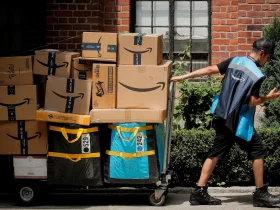In the ever-growing world of e-commerce, many sellers are seeking ways to optimize their businesses, leading to the rise of Amazon automation services. These services aim to help business owners by automating various aspects of their Amazon store, reducing the need for manual input and making operations more streamlined. As a result, they offer sellers a competitive edge with improved efficiency and the potential for increased profits.
With so many Amazon automation services available, it can be overwhelming to determine which one is the best fit for your individual business needs. Each service caters to different aspects of an Amazon store, such as inventory management, pricing strategies, product listings, and customer service. Some offer comprehensive solutions, while others focus on specific areas of your e-commerce operations. The key to selecting the best automation service is understanding your business goals and choosing a service that supports those specific objectives and has a proven track record of success.
Key Takeaways
- Automation services streamline your Amazon store operations
- Different services cater to various aspects of an e-commerce business
- Understand your goals to select the best Amazon automation service
Best Amazon Automation Services
Amazon automation services help businesses streamline their operations, allowing them to focus on growth. The vast array of services available offer unique features tailored to the needs of the clients. In this section, we will discuss some top Amazon automation services that you may find helpful for your business.
Seller Labs is a comprehensive solution for Amazon sellers looking to optimize their listings, manage inventory, and automate customer feedback. Features such as keyword research, automated emails, and advertising management make this service well-rounded for businesses of all sizes.
Jungle Scout is another reliable option, with a strong focus on product research and data-driven insights. The platform offers tools for tracking sales data, monitoring competitors, and automating review requests. It also includes a suite of educational resources for Amazon sellers, catering to both beginners and experienced sellers alike.
Helium 10 stands out for its advanced suite of tools that cater to larger sellers or those with a higher level of operational complexity. It includes tools for inventory management, keyword tracking, as well as listing optimization. The platform also offers multilingual support, making it a great choice for international sellers.
When choosing an Amazon automation service, consider the specific needs and goals of your business. Each platform offers a unique set of features and benefits that cater to different aspects of your Amazon operations. Regardless of your choice, automating time-consuming tasks is sure to improve your overall efficiency and help your business grow.
Key Features of Automation Services
AI and Machine Learning
Automation services use AI and machine learning to improve decision-making for ecommerce sellers. They analyze data to optimize product listings and prices, which helps maximize profits. These advanced algorithms also help in identifying trends and opportunities in the market.
Integration and Efficiency
Automated services integrate seamlessly with Amazon’s FBA program and other ecommerce platforms, streamlining operations and improving efficiency. Tools like Jungle Scout simplify the process of maintaining store inventory, automating tasks, and tracking performance.
Inventory Management and Product Listing
Efficient inventory management is crucial for Amazon sellers. Automation services help in tracking stock levels, automating reorder processes, and preventing stockouts. They also assist in optimizing product listings by using data-driven insights to improve product visibility and relevance.
- Inventory tracking
- Automated reordering
- Product listing optimization
Accounting and Account Suspension
Automating accounting processes reduces the risk of errors and ensures accurate financial records. Automation services help in managing sales, expenses, and tax calculations. Additionally, these services offer support in case of account suspension by providing guidance and resources to resolve the issue.
- Expense tracking
- Tax calculation
- Account suspension support
Amazon Store Management
Automation services help in managing various aspects of an Amazon store, such as pricing, advertising, and customer service. By automating these processes, sellers can focus on other vital aspects of growing their business.
- Pricing management
- Advertising optimization
- Customer service automation
Types of Amazon Automation Models
Dropshipping
Dropshipping is a popular Amazon automation model. It involves online sellers working with suppliers to directly ship products to customers. This eliminates the need for inventory management, as the seller never actually stocks the product. Amazon sellers using this model simply list products on their storefronts and then outsource order fulfillment to the supplier. Dropshipping on Amazon can be both scalable and cost-effective.
FBA
Amazon FBA (Fulfillment by Amazon) is another dominant automation model. This service allows sellers to store their products in Amazon’s fulfillment centers, and Amazon will handle storage, packaging, and shipping on their behalf. FBA offers sellers access to Amazon’s vast logistics network, leading to faster and more reliable delivery. Amazon also handles customer service and returns for FBA sellers, allowing them to focus more on other aspects of their business.
Wholesale Business
In the Wholesale Business model, Amazon sellers work directly with manufacturers or established distributors to acquire products at lower wholesale prices. They then list these products on Amazon and sell them at a markup. This model is desirable for entrepreneurs looking to enter the market quickly, as it offers a wide selection of existing products. However, it is important for Amazon wholesalers to establish long-lasting relationships with suppliers to maintain competitive pricing and stock availability.
Private Label
The Private Label model involves Amazon sellers either manufacturing their own products or sourcing them from existing manufacturers and rebranding them under their own private label. This enables them to differentiate their products in the market and offer unique selling propositions. Private Label sellers can build brand loyalty among customers and enjoy higher profit margins. However, this method requires significant upfront investment in product development, marketing, and inventory management.
Cost and Profitability Analysis
When considering an Amazon automation service, it is important to weigh the costs against the potential profitability and passive income generated from the automated store. Each service provider will come with its own pricing structure, but understanding these costs and potential returns will give you a clearer picture of what to expect.
Initial costs often include a setup or onboarding fee that can vary depending on the scale and complexity of your store. Additionally, monthly service fees are commonly charged as a percentage of your overall sales. This can range from 10% to 30%, sometimes including performance-based bonuses for exceeding sales targets.
**Example Pricing Structure:**
- Setup fee: $2,500
- Monthly service fee: 15% of overall sales
- Performance bonus: 5% additional service fee for sales over $10,000/month
In terms of profitability, your revenue generation will depend greatly on the products, categories, pricing strategies, and competition within the market. Although automation services can help with these factors, it is crucial to conduct thorough market research and set realistic expectations for your specific niche.
Passive income generation through Amazon automation services can be highly lucrative if managed effectively. Profits can be maximized by optimizing your product listings with competitive pricing, solid advertising campaigns, and enticing promotions. Profit margins may vary based on the product type, supplier costs, and Amazon FBA fees. A rough guideline for expected profit margins is typically between 15% to 45%.
To calculate your overall profitability, consider the costs of the automation service in proportion to the expected sales and profit margins. Below is an example calculation using placeholder values:
1. Monthly sales: $10,000
2. Gross profit margin: 40% ($4,000)
3. Service fee (15%): $1,500
4. Net profit before taxes: $2,500
In this example, the net profit generated per month is $2,500, providing a steady stream of passive income. Remember to account for tax liabilities and other potential operational expenses as well.
By carefully analyzing the costs and profitability associated with Amazon automation services, you can choose the right provider and plan that meets your financial goals and expectations. Manage your store effectively, and you can reap the rewards of a passive Amazon FBA income.
Pros and Cons of Amazon Automation
Amazon automation services offer various benefits and drawbacks for business owners who are looking to optimize their presence on the e-commerce platform. This section covers the pros and cons of using these services to help you make an informed decision.
Pros:
- Trust: Many automation services have a proven track record of success, giving you confidence in their ability to manage and scale your Amazon business.
- Efficiency: Automation allows you to save time by streamlining tasks such as inventory management, order processing, and accounting. This frees you up to focus on other aspects of your business.
- Increased Sales: Implementing automation can help to optimize your product listings and ad campaigns, resulting in more sales and higher profits.
- Data-Driven Decisions: Utilizing automation tools enables you to make data-backed decisions about pricing, inventory, and marketing strategies.
- Value for Money: If implemented correctly, the return on investment can be significant when compared to the cost of the automation service.
Cons:
- Upfront Costs: Some automation services require an initial investment, which can be a barrier for small business owners or those with limited resources.
- Dependency on Service Providers: Entrusting your business to an automation service can make you reliant on their expertise, potentially putting your business at risk if they go out of business or fail to deliver on expectations.
- Loss of Control: Handing over certain aspects of your business to an automation service can mean giving up some level of control, which may not be suitable for every business owner.
- Complexity: The process of integrating automation into your business can be complicated, with some services requiring a steep learning curve or in-depth knowledge of the Amazon platform.
Considering the pros and cons discussed above, Amazon automation services can be an invaluable tool for optimizing your e-commerce presence. Weighing the potential benefits and drawbacks in the context of your unique business goals will help guide your decision to invest in an Amazon automation service.
Selecting the Right Automation Service
Expertise and Experience
When choosing an Amazon automation service, it’s crucial to consider the provider’s expertise and experience. A confident and knowledgeable provider will have a proven track record in store management and Amazon product research. Look for a company with a demonstrated history of successful projects and satisfied clients.
Provider Reviews
An effective way to gauge the quality of an automation service is by examining provider reviews. Neutral and clear testimonials from other businesses can give valuable insights into the strengths and weaknesses of a service. Websites like Fiverr often have in-depth user reviews you can use to narrow down your options and find a suitable match.
Product Research
An essential aspect of Amazon automation is product research. A top-notch provider should be proficient in identifying potential best-sellers, analyzing competitor products, and understanding market trends. This way, you can focus on growing your business while the automation service takes care of the research.
- Competitor Analysis: Monitor competitors’ products, pricing, and strategies.
- Market Trends: Identify emerging and popular niches within the marketplace.
- Best-Sellers: Discover potential best-selling products to include in your inventory.
Value for Money
Lastly, consider the value for money offered by an Amazon automation service. Ensure that the pricing is reasonable and competitive, while still providing high-quality services. Compare different providers to find the best value, as this will help your business save resources while still enjoying the benefits of professional Amazon store management.
- Transparent Pricing: Providers should offer clear, upfront pricing without hidden fees.
- Custom Packages: Flexibility in service offerings, tailored to your specific needs.
- ROI: Consider the potential return on investment that the service is likely to bring.
Avoiding Scams and Finding Legitimate Services
In the world of Amazon automation services, it’s crucial to stay vigilant and avoid falling for scams. To ensure you select a trustworthy and reliable provider, follow these steps:
- Research the company: Look for reviews and testimonials about the service, ideally from reputable sources. Doing thorough research will help you separate genuine automation services from scams. Investigate the company’s background, experience, and track record.
- Verify customer support: A legitimate automation service will have a responsive customer support team. Test this by reaching out to their support department before signing up to assess their responsiveness and professionalism.
- Check pricing: If the pricing seems too good to be true or unusually high, it might be a scam. Compare the service’s costs with other reputable providers and industry standards. Do not fall for low-cost offers that may sacrifice quality.
- Avoid unrealistic promises: Steer clear of services that promise you instant success or guaranteed results. Amazon automation should be a gradual process, with steady growth in your sales and business operations over time.
- Request a demo or trial: Reputable services typically offer demos or trial periods to give you a taste of how their platform works. If a service does not provide this, be cautious as it may be a scam.
In conclusion, to avoid Amazon automation scams and make an informed decision about your provider, it’s important to research carefully and follow these guidelines. Keep in mind that not all Amazon automation services are scams, and there are legitimate, effective providers available to help grow your online business.
Alternative Solutions
Virtual Assistants
Virtual assistants can be a great alternative to full-scale Amazon automation services. These professionals possess a variety of skills, including inventory management, order processing, and customer service. Some benefits of using virtual assistants are:
- Cost-effective: Hiring a virtual assistant is often more affordable than subscribing to a comprehensive automation service.
- Flexibility: Virtual assistants can adapt to your specific needs and business operations.
However, virtual assistants might not offer the same level of automation and sophistication that dedicated services provide.
Freelancers
Freelancers are another alternative to consider for handling tasks related to selling on Amazon. They offer a range of expertise, from marketing and product listing optimization to graphic design and data analysis. Some advantages of hiring freelancers include:
- Specialized knowledge: Freelancers often have niche expertise which can help boost your Amazon sales.
- Pay-per-task: Unlike automation services, you only pay freelancers for the specific tasks they perform.
On the downside, managing multiple freelancers for different tasks can be challenging, and their availability might not be consistent.
E-commerce Tools
A variety of e-commerce tools can help you streamline your Amazon selling process without relying on a complete automation service. These tools can be used individually or in combination with each other. Some popular e-commerce tools are:
- Inventory management: Tools like inFlow and Zoho Inventory simplify stock tracking and order fulfillment.
- Pricing optimization: Solutions such as RepricerExpress and Feedvisor help you stay competitive with dynamic pricing strategies.
- Product listing: Tools like Listing Mirror and Sellbrite enable you to create and sync product listings across multiple marketplaces.
While e-commerce tools can be a more affordable option, they might require more hands-on management compared to a comprehensive automation service.
Conclusion
Amazon automation services provide a valuable solution for online sellers who want to optimize their operations. By leveraging these services, businesses can save time, increase efficiency, and ultimately achieve greater success.
One key benefit of using an automation service is the ability to manage inventory more effectively. This can lead to reduced stockouts and overstock issues, resulting in customer satisfaction and increased sales. Additionally, automation tools can help sellers with price optimization, ensuring they remain competitive within the marketplace.
Another important advantage of Amazon automation services is the opportunity to improve order processing and fulfillment. By streamlining these aspects of a business, sellers can enhance their overall customer experience and focus on growing their operations strategically.
In summary, Amazon automation services offer a powerful solution for online sellers looking to take their business to new heights. To make the most of these services, be sure to research various providers and choose the one that best aligns with your business needs, goals, and budget.
Frequently Asked Questions
What are the top-rated automation services for FBA?
There are several highly-rated Amazon automation services for FBA. Some of the top choices include:
- SellerApp
- Sellics
- Jungle Scout
- Helium 10
- Viral Launch
These tools offer various features that assist sellers in managing and growing their businesses on the Amazon marketplace.
How do different Amazon automation services compare?
Amazon automation services can be compared based on the following factors:
- Features: Some tools offer inventory management, keyword research, competitive analysis, and product research, while others focus on specific aspects like PPC management or listing optimization.
- Ease of use: User-friendly interfaces and intuitive dashboards make it easier to navigate and utilize these tools.
- Pricing: The cost of each service varies, and some offer tiered pricing plans to cater to different business sizes and budgets.
- Customer support: Look for tools with reliable support through multiple channels, such as email, chat, and phone, for prompt assistance.
Each tool has its own strengths and weaknesses, so it’s essential to understand your business needs and choose the one that aligns best with them.
What factors should I consider when choosing an Amazon automation service?
When choosing an Amazon automation service, consider:
- The specific features you need for your business
- Your budget
- Compatibility with your e-commerce platform
- Reputability and user reviews of the service
- The availability and quality of customer support
Is Amazon FBA automation really worth it?
Yes, Amazon FBA automation can be worth it for many sellers. Automation tools help save time, reduce human error, and streamline the management of various tasks. This allows sellers to focus on strategic decision-making and business expansion. However, the value of FBA automation depends on each seller’s unique situation and needs.
How do Amazon automation tools improve efficiency?
Amazon automation tools improve efficiency by:
- Automating tedious and repetitive tasks such as inventory management, order tracking, and competitive analysis
- Providing data-driven insights for informed decision-making
- Allowing better management of PPC campaigns for optimal advertising performance
- Facilitating customer satisfaction with automated feedback requests and customer support management
How can I optimize my Amazon FBA store using automation?
To optimize your Amazon FBA store using automation, consider:
- Utilizing available tools for inventory management, product research, and pricing optimization
- Leveraging software that monitors and adjusts your PPC campaigns automatically
- Implementing listing optimization tools that analyze keywords, search rankings, and competition
- Automating customer feedback and review management to maintain a high seller rating













